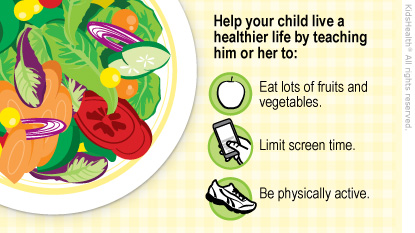Metabolic Syndrome: How to Care for Your Child
Metabolic syndrome is a group of health problems, including too much belly fat, high blood pressure, high blood sugar levels, and high triglycerides and cholesterol (types of fat in the blood). These health problems increase a child's risk of developing other serious medical problems. Making good diet choices and getting plenty of exercise can help your child live a healthier life.


Make healthy choices a regular part of your family's routine. Here are some tips:
-
Prepare meals at home when possible. Limit trips to restaurants and fast-food places.
-
Eat together as a family as often as possible.
-
Offer nutritious meals and snacks. Follow your health care professional's advice on the right portion sizes for your child.
-
Teach your child to read food labels so he or she can limit sugar, salt, cholesterol (found in meat, eggs, whole milk, butter, and cheese), and saturated fats (found in meat, butter, shortening, lard, cheese, and whole milk).
-
Teach your child to avoid trans fats (found in baked goods, fried foods, stick margarines, and shortening).
-
Serve whole grains, fruits, vegetables, beans, and some "healthy" fats, like those in olive oil and nuts.
-
Don't give your child soda, sugary drinks, or juice.
-
Help your child be active every day.
-
Make family rules about screen time. Don't let screen time get in the way of being active, getting enough sleep, and connecting with family and friends.
-
Kids who get enough sleep are less likely to be overweight. Help your child get enough sleep.
-
Follow your health care professional's recommendations about:
-
If your child or anyone else at home smokes, go to smokefree.gov or call 1-800-QUIT-NOW (1-800-784-8669) to get help quitting.

Your child:
-
starts getting headaches
-
is often very thirsty
-
needs to pee a lot

How do health care providers diagnose metabolic syndrome? They check:
-
weight and waist size
-
blood pressure
-
blood sugar
-
cholesterol
-
triglycerides
If enough of these measurements and tests are abnormal, a child has metabolic syndrome.
Why is it important to treat metabolic syndrome? Treating metabolic syndrome is important for your child's health today and in the future. If metabolic syndrome is not treated, kids can develop type 2 diabetes and, as adults, could be at risk for heart attack or stroke.
Now is the perfect time to help your child learn healthy eating and physical activity habits that can last a lifetime.